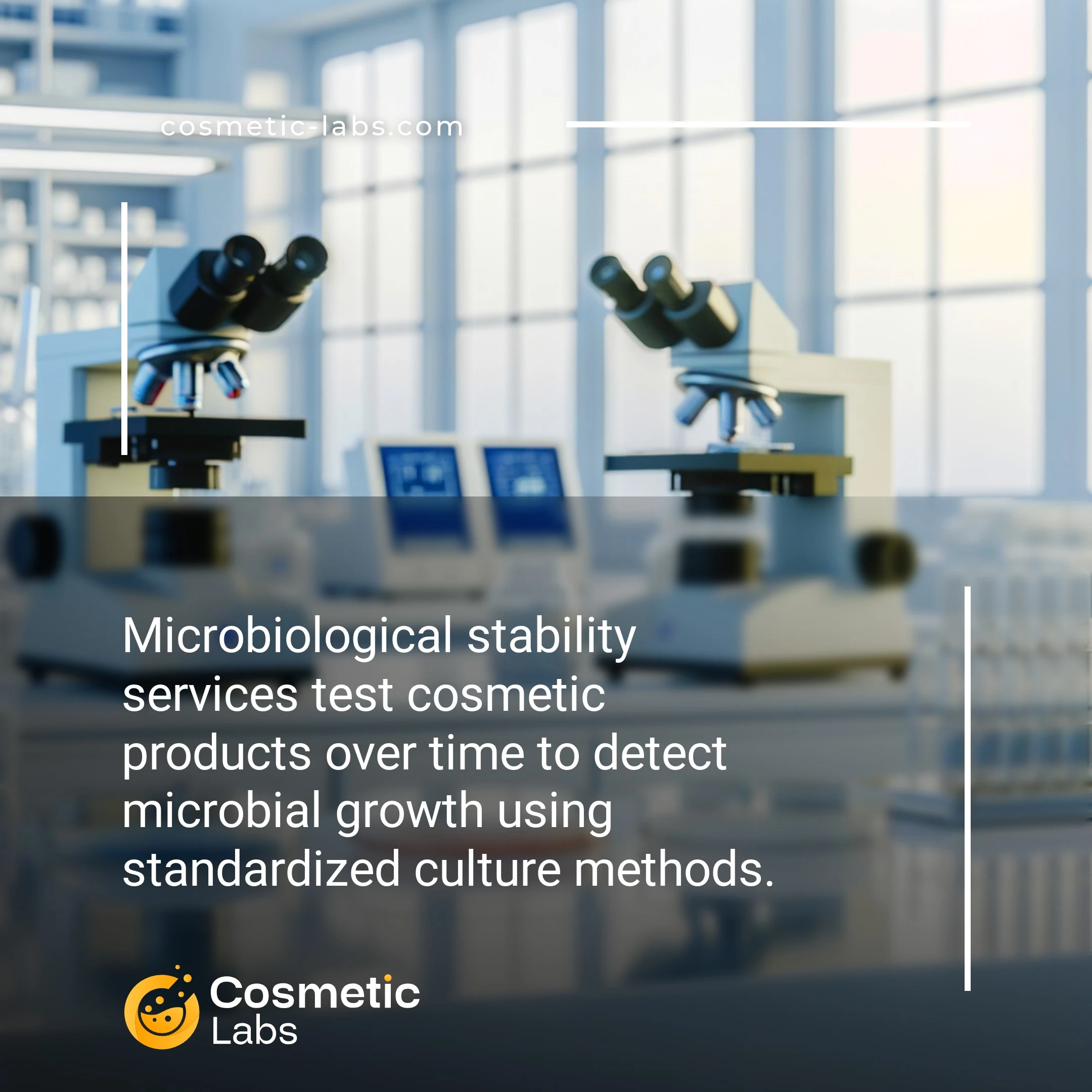Microbiological Stability Services for Reliable Cosmetic Product Testing and Safety

What is Microbiological stability?
Microbiological stability services test your cosmetic products against bacteria, yeast, and mold growth over time, using challenge tests that introduce specific microorganisms to verify your preservative system works. Labs monitor contamination levels at 7, 14, and 28-day intervals under different storage conditions, providing shelf-life validation data that meets regulatory standards before your product launches.
Why do you need this service?
Cosmetic labs apply microbiological stability testing to validate preservative systems in water-based formulations like serums, lotions, and shampoos before market launch. These specialized tests determine exact preservative concentrations needed to prevent bacterial and fungal growth throughout a product’s shelf life, helping brands avoid costly recalls and ensure consumer safety compliance with FDA and EU regulations.
Who provides Microbiological stability services?
All cosmetic labs providing Microbiological stability services
There is no company providing these services at the moment.
Microbiological Stability Testing Services
Microbiological stability testing determines how well your cosmetic products resist contamination over time. Labs on our platform run preservative efficacy tests and shelf-life studies to verify your formulas stay safe from bacteria, yeast, and mold throughout their intended use period.
Challenge Testing and Contamination Analysis
Challenge tests expose your product to specific microorganisms to measure preservative performance. Labs inoculate samples with bacteria like E. coli and S. aureus, then track reduction rates over 28 days.
Testing protocols include:
- USP 51 antimicrobial effectiveness testing
- ISO 11930 cosmetic preservation evaluation
- Real-time stability monitoring at different temperatures
- Contamination identification using DNA sequencing
Results show whether your preservative system works at the concentration you’ve chosen.
Shelf-Life Validation Methods
Labs validate product stability through accelerated aging studies and real-time monitoring. They store samples at 40°C for three months to simulate one year of shelf life, checking microbial counts monthly.
Standard validation services cover:
- Baseline microbial enumeration (bacteria, yeast, mold counts)
- Pathogen screening for P. aeruginosa and C. albicans
- pH and water activity measurements
- Package compatibility testing with preservatives
These tests help you set accurate expiration dates and support product safety claims. Partner labs typically deliver results within 4-6 weeks for standard protocols.
Real-World Applications of Microbiological Stability Testing
Cosmetic labs apply microbiological stability services across product development stages to verify formulations resist contamination and meet shelf-life requirements.
Water-Based Product Development
Labs focus microbiological testing on emulsions, serums, and toners containing 60-95% water content. Testing protocols examine bacterial and fungal growth at 25°C and 40°C storage conditions over 28-day periods.
Products like micellar waters and gel cleansers undergo challenge tests with five standard microorganisms: E. coli, P. aeruginosa, S. aureus, C. albicans, and A. brasiliensis. Labs measure log reductions at days 7, 14, and 28 to confirm preservative systems achieve required 3-log bacterial reduction within 14 days.
Multi-Phase Formula Validation
Complex formulations with oil and water phases require targeted stability assessments. Labs test each phase separately before evaluating the complete formula, checking pH shifts, viscosity changes, and microbial counts.
Sunscreens, BB creams, and moisturizers with SPF undergo accelerated aging at 45°C for 3 months while monitoring preservative efficacy. This predicts 24-month shelf stability and identifies formulation weaknesses before production scaling.
| Product Type | Test Duration | Key Parameters | Pass Criteria |
|---|---|---|---|
| Water-based serums | 28 days | Total plate count, yeast/mold | <100 CFU/g |
| Emulsified creams | 3 months | Challenge test, pH stability | 3-log reduction, pH ±0.5 |
| Anhydrous balms | 6 months | Water activity, oxidation | aw <0.6, PV <10 |
| Clay masks | 12 months | Spore count, texture | <10 CFU/g, no separation |
Partner with specialized cosmetic labs on our platform to implement these microbiological stability protocols for your formulations.
